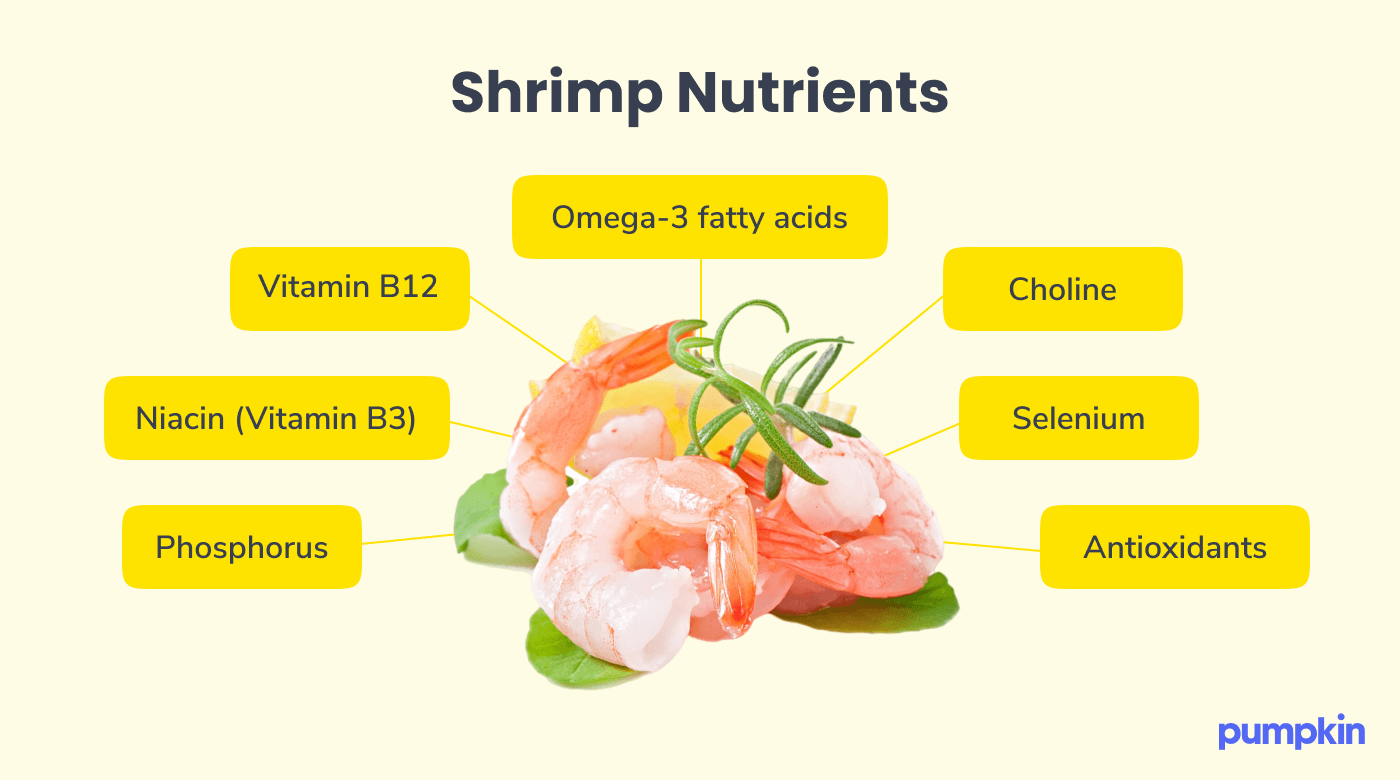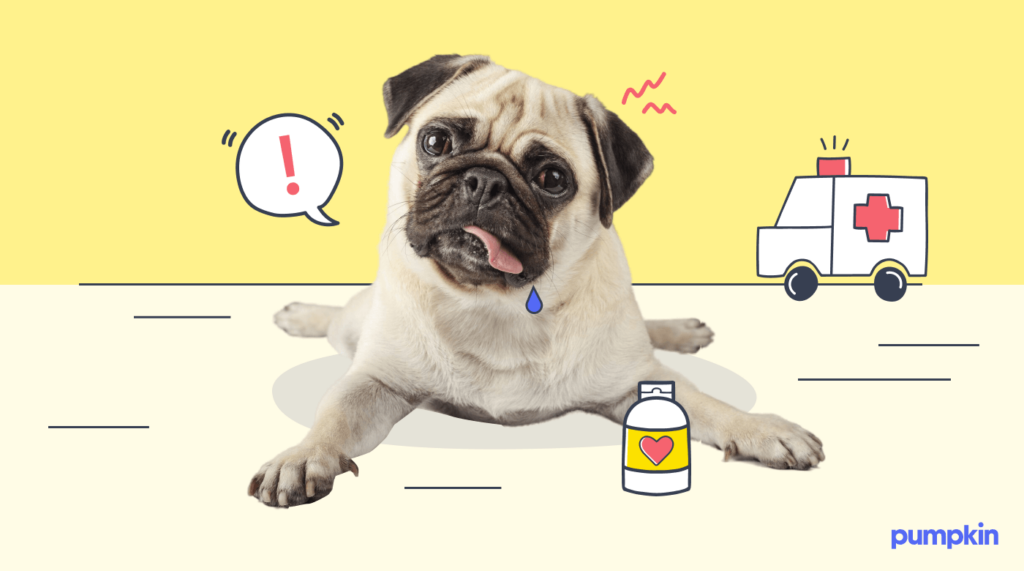Key Points:
- Dogs can eat cooked shrimp in moderation.
- Shrimp provide dogs with protein, vitamin B12, niacin, and phosphorus.
- Too much shrimp can lead to high cholesterol levels in dogs, so keep portions small.
As pet parents, many of us enjoy sharing food with our pups.
Most of the time, it’s a safe way to add a little joy to their diets — and some extra wagging to their tails. But sometimes, the risks outweigh the benefits, and shrimp can be one of those tricky treats.
Dogs can eat shrimp, and it offers excellent nutritional benefits. However, there are a few precautions you should consider. After all, we don’t want your pooch to end up with an upset stomach — and we don’t want you falling out of your chair at dinner while you make a mad dash to the backyard with your pup.
Let’s dive into the benefits of shrimp for dogs, the risks, and feeding tips to keep your dog safe.
Cooked shrimp is safe for dogs
Shrimp are safe for dogs as long as they are prepared correctly. Shrimp meat is the only part of this shellfish that is safe for them to consume.
Do not feed your dog shrimp tails and shells. The shrimp’s hard exoskeleton (or shrimp shells) is made of chitosan. It’s very hard for your dog to digest and has sharp, irregular edges that can perforate your pup’s digestive tract or even their intestines. It can also cause choking hazards and blockage problems.
Also, only feed your pup cooked shrimp meat. Dogs should not eat raw shrimp since it may contain harmful pathogens that could make them sick. Make sure the shrimp is thoroughly cooked by boiling, baking, or steaming it.
Lastly, while fried, breaded shrimp is a popular treat among humans, the oils, seasonings, additives, and salts are never healthy for your dog. So, consider popcorn shrimp off the menu.
Health benefits of shrimp for dogs
Shrimp meat is low in calories, with one medium-sized shrimp containing as little as 5 calories.
The nutritional value of shrimp for dogs is high as it’s packed with vitamins, minerals, and other nutritional components, including:
- Omega-3 fatty acids
- Niacin
- Vitamin B12
- Choline
- Copper
- Iodine
- Selenium
- Phosphorus
The nutrients in shrimp offer pups a range of health benefits like:
- Strengthening your dog’s immune system
- Fortifying their muscles and bones
- Decreasing inflammation
- Promoting healthy skin and shiny coats
- Maintaining healthy digestion and cell formation
- Supporting organ function and health
- Destroying free radicals

As you can see, shrimp has a few different benefits for pups. With their low-calorie, low-carb, and high-protein content, the occasional shrimp makes an excellent treat for your dog. But there are precautions to consider before serving any type of seafood.
Risks of feeding shrimp to dogs
Let’s look at some risks of feeding your dog shrimp. Many of these risks also apply to other types of dog-safe seafood, including fish such as salmon.
Bad bacteria
If not cooked properly, your pooch can get an infection from Salmonella or Listeria, affecting their gastrointestinal health and requiring vet attention.
Symptoms of Salmonella poisoning in dogs include:
- Vomiting
- Diarrhea (can be bloody)
- Loss of appetite
- Fever
- Lethargy
Symptoms of listeriosis (a Listeria infection) include:
- Facial paralysis
- Disorientation
- Lowered eyelids
- Lethargy
- Weakness
- Lack of coordination
Parasites
Raw seafood sometimes contains parasites that can be transferred to our pets. To eliminate the risks of parasites, you just need to make sure any seafood you serve your pup is properly cooked.
Cholesterol
Besides the cholesterol we manufacture in our bodies naturally, dietary cholesterol comes in two types — plant-based and animal-based. The bad cholesterol is animal-based.
Shrimp is high in bad cholesterol, which can cause plaque in your dog’s arteries leading to heart problems over time. It’s uncommon for dogs to have high cholesterol, but it can happen.
Pancreatitis
In rare cases, the high fat content in shrimp can trigger pancreatitis in susceptible dogs. This is an inflammatory reaction within the pancreas that can cause several symptoms, including diarrhea, severe abdominal pain, loss of appetite, vomiting, and extreme fatigue.
If your dog has a history of pancreatitis or any other gastrointestinal issues, it’s best to steer clear of shrimp — at least until you’ve consulted a veterinarian.
Growth hormones
Farmed-raised shrimp are imported from countries that don’t have the same FDA regulations as we do. The shrimp are raised in ponds, and some farms use antibiotics, growth hormones, and pesticides.
These could cause problems for your dog, especially if they have a sensitive digestive system. With their developing immune systems, puppies can be especially susceptible to stomach upset or an allergic reaction to this protein source.
Choking hazard
As with most human food, shrimp can be a choking hazard for your dog. This is especially the case when you feed the shells, heads, or tails to them.
Pet Pro Tip: If you have a dog that is prone to ‘snacksidents’ – you should consider getting a dog insurance plan as soon as possible. It can help you afford the best care in the future by covering eligible vet bills for digestive illnesses, toxic ingestion, and more.
Shellfish allergies
Even though shrimp is one of the most commonly consumed shellfish in the U.S., it’s also one of the most allergenic. And just as with humans, dogs can be allergic to shellfish, too.
The first time you offer shrimp to your dog, watch for any intolerances like stomach or gastrointestinal upset, vomiting, or diarrhea. If any symptoms are present, stop offering shrimp and talk to your veterinarian.
Dogs can also suffer a more serious allergic reaction to shrimp called anaphylaxis.
Anaphylaxis, or allergic shock, happens quickly after ingestion and requires immediate vet attention.
Look for signs such as:
- Shock
- Trouble breathing
- Swelling of muzzle or tongue
- Excessive drooling
- Vomiting
- Urination
- Inability to control bowels
- Bluish color to gums and tongue

When the unexpected happens, pet insurance can help you afford the best care by covering eligible vet bills. This lets you focus on what really matters — getting your pup the care they need and deserve.
How to prepare shrimp for dogs
To feed shrimp to your dog the right way, it must be cooked thoroughly. Prepare shrimp without oils, seasoning, or sauces that could upset your dog’s tummy, like garlic powder or cocktail sauce.
Fresh shrimp should always be peeled and deveined before cooking. The best way to prepare shrimp is to boil or steam them (with no added ingredients) until they are opaque. This will destroy any parasites and bacteria in the meat.
Add shrimp gradually and in small quantities to your dog’s diet and carefully observe their reaction.
If your dog has pre-existing health conditions, consult your veterinarian before adding shrimp to their diet.
Can puppies eat shrimp?
Once they start eating solid food, cooked plain shrimp is safe for puppies in small amounts. Like with adult dogs, you also need to cut the shrimp into small pieces to avoid choking and monitor your pup for any bad reactions.
What other seafood can I feed my pup?
There are several seafood alternatives to shrimp that dogs can eat — in moderation. Make sure you consider your dog’s size to avoid giving them too much.
The following fish and shellfish are safe for pooches when prepared properly:
- Sardines
- Salmon
- Green-lipped mussels
- Whitefish (cod or haddock)
- Trout
- Mackerel
- Herring
Aside from fish, other healthy sources of protein for dogs include:
- Chicken
- Turkey
- Beef
- Lamb
So, can dogs have shrimp?
Dogs can have shrimp in moderation as long as it’s been prepared correctly. Simply put, boiled shrimp is safe, but popcorn shrimp, fried shrimp, and raw shrimp shouldn’t be on the menu. Most importantly, the meat must be properly cooked to remove any pathogens that could make them sick.
If you frequently feed your dog food from the table (or even if you don’t), regular vet visits can keep your dog healthy and thriving. These appointments are also a good opportunity to ask your vet about any new foods or changes to your dog’s diet.
FAQs
- https://fdc.nal.usda.gov/fdc-app.html#/food-details/175180/nutrients
- https://www.fda.gov/animal-veterinary/animal-health-literacy/get-facts-about-salmonella
- https://wagwalking.com/condition/listeria
- https://eclinpath.com/chemistry/energy-metabolism/cholesterol/
- https://www.health.com/nutrition/calories-in-shrimp
- https://www.merckvetmanual.com/generalized-conditions/listeriosis/listeriosis-in-animals#Pathogenesis_v3273586
- https://www.akc.org/expert-advice/nutrition/how-many-treats-can-dog-have/




